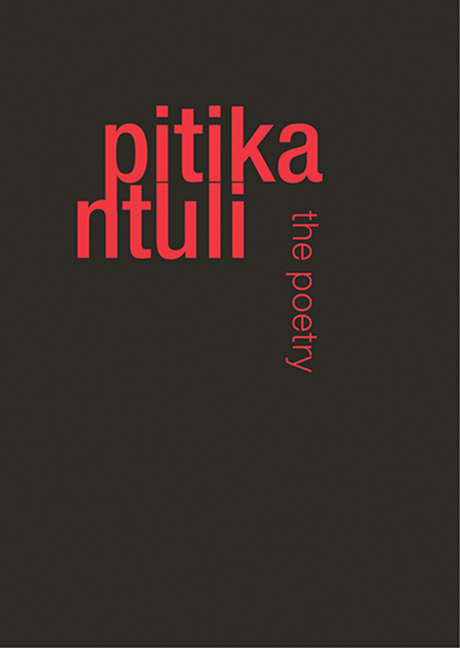Book contents
- Frontmatter
- Contents
- Foreword
- A Gentle Warning
- Scent of Invisible Footprints in Moments of Complexity
- Biko Reborn
- We Begin a New Era
- Kept Alive in Chains
- In My Art
- My Body is a Centre of Colliding Forces
- Conversations With Stone
- Twin Forces
- In a Recurring Anthropomorphic Dream
- They Came in Waves
- They Say His Nose
- Burdens of the Past
- Musical Words
- In Our Culture
- Locked in an Embrace
- Translucent Ideas
- Black Like an Angolan Night
- We Have Lost the Faces of Footprints
- I Suckled the Smooth Breast
- Of One Mind
- Spiralling Into Existance
- I Look Down
- I Carry Echoes in My Eardrums
- There Are Echoes of String
- Long Breasted One
- I Carried Out an Autopsy
- Vumani Bo!
- Child of My Mother
- I Love You With the Power of Undulating
- Third Insurrection of Feet
- Exhausted But Inspired
- We Dug Gold And Diamonds
- Twenty-First Insurrection of the Exhaust Pipe
- Tenth Insurrection of the Exhaust Pipe
- Thirteenth Insurrection of the Exhaust Pipe
- Pressured To the Limit
- Too Many Many Nights of Blackouts
- Modigliani's Second Memory
- Modigliani's Memory
- Sixth Insurrection of the Wheelbarrow
- Third Insurrection of the Wheelbarrow
- The Insurrection of Hyenas
- Amedeo Modigliani
- In the Past When Stones Were Still Soft As Butter
- Footprints
Foreword
Published online by Cambridge University Press: 28 February 2020
- Frontmatter
- Contents
- Foreword
- A Gentle Warning
- Scent of Invisible Footprints in Moments of Complexity
- Biko Reborn
- We Begin a New Era
- Kept Alive in Chains
- In My Art
- My Body is a Centre of Colliding Forces
- Conversations With Stone
- Twin Forces
- In a Recurring Anthropomorphic Dream
- They Came in Waves
- They Say His Nose
- Burdens of the Past
- Musical Words
- In Our Culture
- Locked in an Embrace
- Translucent Ideas
- Black Like an Angolan Night
- We Have Lost the Faces of Footprints
- I Suckled the Smooth Breast
- Of One Mind
- Spiralling Into Existance
- I Look Down
- I Carry Echoes in My Eardrums
- There Are Echoes of String
- Long Breasted One
- I Carried Out an Autopsy
- Vumani Bo!
- Child of My Mother
- I Love You With the Power of Undulating
- Third Insurrection of Feet
- Exhausted But Inspired
- We Dug Gold And Diamonds
- Twenty-First Insurrection of the Exhaust Pipe
- Tenth Insurrection of the Exhaust Pipe
- Thirteenth Insurrection of the Exhaust Pipe
- Pressured To the Limit
- Too Many Many Nights of Blackouts
- Modigliani's Second Memory
- Modigliani's Memory
- Sixth Insurrection of the Wheelbarrow
- Third Insurrection of the Wheelbarrow
- The Insurrection of Hyenas
- Amedeo Modigliani
- In the Past When Stones Were Still Soft As Butter
- Footprints
Summary
The Heart of Sculpture & The Soul of Poetry
The Poet Is a predator Violates linguistic principles strangling morphology Murdering syntax kidnapping phonetics Lock it up in muted cages of sounds Reorganises epistemologies Whilst dancing on ontological essences Pronounce on axiological questions Reinvents language A poet is a policeman Arrests words and magisterially sentence them into terms Of imprisonment To serve pressing agendas of hope and despair And touch the pulse of anguish and redemption! The poet is! (Pitika, 2014)
Pitika Ntuli is a South African sculptor and poet whose works in metal, wood, bone, stone, plastic and bronze speak directly to African sculptural traditions, whilst interrogating Western post-modern concepts. As an academic he taught at Middlesex University in the UK on post-modern/postcolonial intersections, and the insights from this discourse are incorporated into his art. His works are full of humour, visual puns and subtle political comment. In his own words:
‘Sculpture to me is a battleground, a bullring; the creative act is a titanic battle between flesh and spirit. Each time a work of art is born, the artist dies a little; a little death invokes a greater desire to live and thus creates another artwork.
‘Sculpture is about mass and space. It must be grounded and free to soar, flow or float through space. The fluids that have passed through it shape a grain of wood or stone, even bone; metal must first be melted. In other words, each material that I use retraces the journeys of its juices, to reflect them, to quote them! The wood must dry up before it is used. The bone must part with decaying flesh and wait for the marrow to harden before the work begins. To sculpt therefore is metaphorically, to revisit the original state of the material, to externalise its fluidity.
‘My art has its very roots in the bowels of exile with its tentativities measured against time lines and space over which I had no control. I began my art practice in exile, infused by my African sensibilities. Ntulis are of the hyena clan; so that scavenging the skips, scrap yards and derelict factory lots of western Europe became my second nature.
Information
- Type
- Chapter
- Information
- The Poetry , pp. ix - xiPublisher: University of South AfricaPrint publication year: 2014
